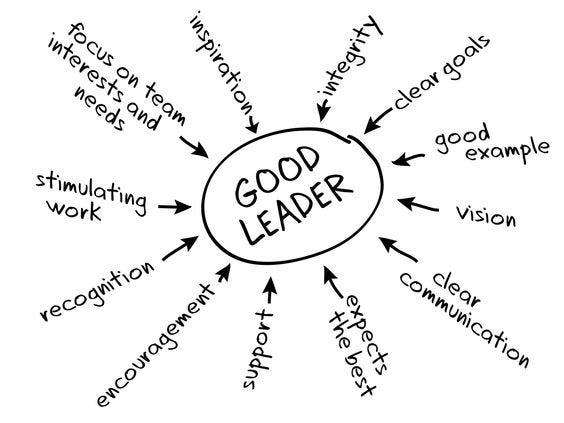Two Articles about Leadership Theories
¡Hola! As part of the intention of creating in this blog a data base for future reference related to leadership, both for my casual readers interested in leadership and for myself, in this post I want to refer briefly to two articles that summarize and review general leadership theories, leadership styles, and research possibilities.
However, in order to keep this post short and concise, I will add the abstracts and a punctual summary of the aspects included on each, as well as a link to the complete articles.
The first article is,
followers," p.9) are,
Furthermore, these leadership styles are conditioned by "a number of factors
that can help to determine which type of leadership style is most effective
and/or when to draw on a different or combination of leadership styles"
(p.10):
The second article covers more ground and spans over several decades of
leadership studies and research, besides suggesting paths for future
development:
To close, I must admit I found many of these theories very suggestive
and they helped me have a clearer view of the evolution of leadership
theory, variables that condition each theory, and also, the challenges
ahead of new educational leaders in the 21st century, including the
perspective of mixing different theories, as suggested in my post
However, in order to keep this post short and concise, I will add the abstracts and a punctual summary of the aspects included on each, as well as a link to the complete articles.
The first article is,
Amanchukwu, R., Jones Stanley, G., & Ololube Prince, N. (2015). A Review of Leadership Theories, Principles and Styles and Their Relevance to Educational Management. Retrieved January 28, 2019, from ResearchGate website: https://www.researchgate.net/publication/283081945_A_Review_of_Leadership_Theories_Principles_and_Styles_and_Their_Relevance_to_Educational_Management
Here's the abstract:
This study was motivated by the premise that no nation grows further than the quality of its educational leaders. The purpose of this theoretical debate is to examine the wider context of leadership and its effectiveness towards improving school management. This academic evaluation examines recent theoretical developments in the study of educational leadership in school management. It begins with a concise overview of the meaning and concept of leadership in terms of research, theory, and practice. This is followed by an examination of the theories of leadership, principles and styles of leadership. Each section ends with an identification of contemporary issues and possible means of amelioration. This article concludes that success is certain if the application of the leadership styles, principles and methods is properly and fully applied in school management because quality educational leadership tradition offers great opportunity to further refine educational leadership and management policies and practices by accepting and utilizing the basic principles and styles of educational leadership.
The main theories reviewed in the article are:
- The "Great Man Theory"
- Trait Theory
- Contingency Theories
- Situational Theory
- Behavioral Theory
- Participative Theory
- Transactional/Management Theory
- Relationship/Transformational Theory
- Skills Theory
followers," p.9) are,
- Autocratic
- Bureaucratic
- Charismatic
- Democratic/Participative
- Laissez-faire
- Transactional
Furthermore, these leadership styles are conditioned by "a number of factors
that can help to determine which type of leadership style is most effective
and/or when to draw on a different or combination of leadership styles"
(p.10):
- Size of the institution
- Degree of Interaction/Communication
- Personality of Members
- Level of Decision Making
The second article covers more ground and spans over several decades of
leadership studies and research, besides suggesting paths for future
development:
Avolio, B., Walumbwa, F., & Webber, T. J. (2009). Leadership: Current Theories, Research, and Future Directions. Annual Review of Psychology 60, (60), 421–449. Retrieved from http://digitalcommons.unl.edu/cgi/viewcontent.cgi?article=1036&context=managementfacpub
Abstract:
This review examines recent theoretical and empirical developments in
the leadership literature, beginning with topics that are currently
receiving attention in terms of research, theory, and practice. We begin
by examining authentic leadership and its development, followed by work
that takes a cognitive science approach. We then examine new-genre
leadership theories, complexity leadership, and leadership that is shared,
collective, or distributed. We examine the role of relationships through
our review of leader member exchange and the emerging work on
followership. Finally, we examine work that has been done on substitutes
for leadership, servant leadership, spirituality and leadership, cross-
cultural leadership, and e-leadership. This structure has the benefit of
creating a future focus as well as providing an interesting way to
examine the development of the field. Each section ends with an
identification of issues to be addressed in the future, in addition to the
overall integration of the literature we provide at the end of the article.
Thus, the theories reviewed by Avolio et al are,
- Authentic Leadership
- Cognitive Psychology and Leadership
- New-Genre Leadership
- Complexity Leadership
- Shared, Collective or Distributed Leadership
- Leader-Member Exchange (LMX)
- Followership and Leadership
- Subsitutes for Leadership
- Servant Leadership
- Spirituality and Leadership
- Cross-Cultural Leadership
- E-Leadership
To close, I must admit I found many of these theories very suggestive
and they helped me have a clearer view of the evolution of leadership
theory, variables that condition each theory, and also, the challenges
ahead of new educational leaders in the 21st century, including the
perspective of mixing different theories, as suggested in my post

Comments
Post a Comment